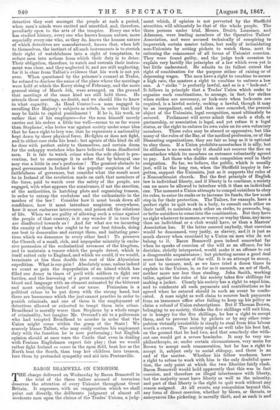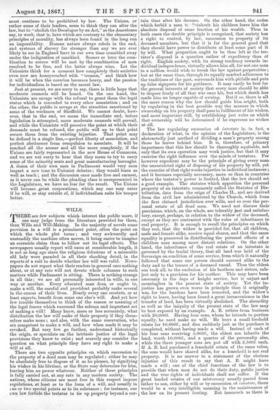BARON BRAMWELL ON UNIONISM. T HE charge delivered on Wednesday by
Baron Bramwell in the trial of the three tailors accused of terrorism deserves the attention of every Unionist throughout Great Britain. It expresses, with an exaggeration which we shall point out directly, the deliberate judgment of almost all moderate men upon the claims of the Trades' Unions, a judg- ment which, if opinion is not perverted by the Sheffield atrocities, will ultimately be that of the whole people. The three persons under trial, Messrs. Druitt, Laurence, and Adamson, were leading members of the Operative Tailors' Association, and were accused technically of conspiring to impoverish certain master tailors, but really of intimidating non-Unionists by setting pickets to watch them, next to rattening the commonest of all forms of Unionist coercion. They were found guilty, and the judge took occasion to explain very lucidly the principles of a law which even yet is but little understood. He admits to its fullest extent the right of combination for the purpose either of raising or of depressing wages. The men have a right to combine to secure a high rate, the masters a right to combine to enforce a low one. A " strike " is perfectly lawful, and so is a " lock-out." It follows in principle that a Trades' Union which seeks to organize such combinations, to arrange, in fact; for strikes when strikes are necessary, or lock-outs when lock-outs are required, is a lawful society, seeking a lawful, though it may be an inexpedient, end, and that once conceded, the present object of the Unionists, legal recognition, must ultimately be secured. Parliament will never admit that such a club, or partnership, or association is legal, and yet refuse it a legal status, or the right to enforce its own rules on its own voluntary members. Those rules may be absurd or oppressive, but like many of the rules of the Bar, of the medical profession, or of the Dissenting organizations, they are fair so long as it is optional to obey them. If a Union prohibits moustaches it is silly, but its silliness is no reason why it should not recover the fine on moustaches which its members on entrance voluntarily agreed to pay. Let those who dislike such compulsion send in their resignation. So far, we believe, the public, which is usually just, will in the long run, when the Sheffield inquiry is for- gotten, support the Unionists, just as it supports the rules of a Nonconformist church. But the first principle of English law is individual liberty, and if liberty is to continue, a society can no more be allowed to interfere with it than an individual can. The moment a Union attempts to compel outsiders to obey its rules, to enter its ranks or to increase its funds, the law must step in for their protection. The Tailors, for example, have a perfect right to quit work in a body, to consult each other on their tariff, to maintain each other on strike, to persuade, beg, or bribe outsiders to come into the combination. But they have no right whatever to menace, or worry, or waylay them, any more than .an individual or a -club would have, or than a Masters' Association has. If the latter coerced anybody, that coercion would be denounced, very justly, as slavery, and ,it is just- as much slavery when exercised by a Union on men who do not belong to it. Baron Bramwell goes indeed somewhat far when he speaks of coercion of the will as an offence, for his doctrine, strictly interpreted, would make it an offence to out a disagreeable acquaintance ; but picketing means a good deal more than the coercion of the will. It is an attempt to annoy, if not to menace, and, as we have tried a dozen times to explain to the Unions, is, so far as it succeeds, an act of theft, neither more nor less than stealing. John Smith, working tailor, against the rules of his society takes five shillings for making a jacket. Clearly his society has a right to expel him, and to confiscate all such payments and contributions as he agreed when he entered should in such an event be confis- cated. A man might as well claim to recover back payments from an insurance office after failing to keep up his policy as claim a refund of Union subscriptions. But if Thomas Brown, belonging to no society, thinks the five shillings will suit him, or is hungry for the five shillings, he has a right to accept them, and to prevent him by pickets or by any other com- pulsion virtually irresistible is simply to steal from him labour worth a crown. The society might as well take his best hat, on the ground that he had two, and that somebody else with- out one would get a severe headache. It may be very un- philanthropic, or, under certain circumstances, very mean for Brown to accept such remuneration, but he has a right to accept it, subject only to social obloquy, and there is an end of the matter. Whether his fellow workmen have a right to refuse to work with him is the only doubtful ques- tion, the only point at which the two liberties fairly clash. Baron Bramwell would hold apparently that this was in fact coercion, and therefore an illegal interference with liberty, but the majority must have liberty as well as the minority, and part of that liberty is the right to quit work without any reason assigned. At all events, any compulsion beyond this, any form of direct coercion, whether by blows, or threats, or annoyances like picketing, is morally theft, and as such is and must continue to be prohibited by law. The Unions, or rather some of their leaders, seem to think they can alter the law, but to "abolish the Decalogue by an Act," as the Americans say, to work, that is, laws which are contrary to the elementary principles of morality, has always been found in the long run an. impossibility. Human nature always rebels in the end, and systems of slavery far stronger than any we are ever likely to see in. England have in our own time crumbled away under the indignation of mankind. Sooner or later the com- bination to coerce will be met by the combination of men resolved to be free, and the latter always wins. Let the Unionists think for a moment how completely their societies even now are honeycombed with "treason," and think how it will be when the coercion becomes heavy, and the passion for individualism is based on the moral law.
Just at present, we are sorry to say, there is little hope that moderate counsels will be heard. On the one hand, the Unionists are savage with the refusal to grant them the legal status which is conceded to every other association ; and on the other, the public is savage at the atrocities sanctioned by some of the workmen of Sheffield. We cannot doubt, how- ever, that in the end, we mean the immediate end, before legislation is attempted, more moderate counsels will prevail, and while the Unionists will perceive the point at which their demands must be refused, the public will up to that point secure them from the existing injustice. That point may be defined in a single line,—perfect liberty of association, and perfect abstinence from compulsion to associate. It will be reached, all the sooner and all the more completely, if the Unions are fairly represented in the new House of Commons, and we are not sorry to hear that they mean to try to carry some of the minority seats and great manufacturing boroughs. A dozen of their own men in Parliament would very soon impart a new tone to Unionist debates ; they would learn as well as teach ; and the discussion once made free and earnest, as it never can be while the pleading class is unrepresented in the Legislature, we have no fear for the result. The Unions will become great corporations, which any one may enter if he will, or stay outside of, if individualism suits his temper better.































 Previous page
Previous page